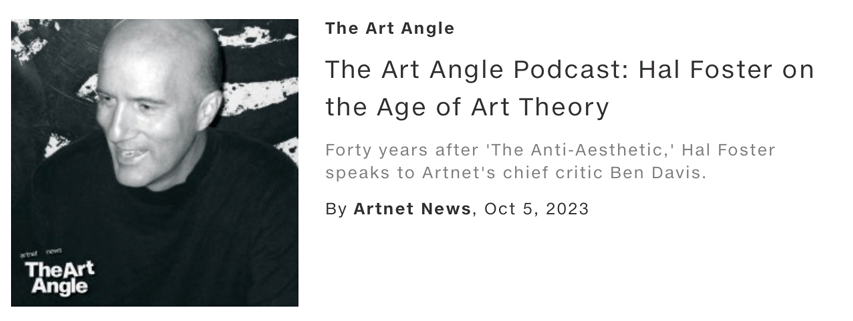October 24, 2023
We were like dogs on a bone

The title of the book was nearly accidental. The Anti-Aesthetic was a compilation of an assortment of various concerns, focuses within Foster's intellectual community, which was panoramic (Habermas, Said, SITE...) But here's the thing: what was later taken as a central rallying flag of an era was really more like spaghetti thrown on the wall to see what sticks. I remember myself and most of my cohorts in grad school pouring over the texts to get a handle on the changing winds... this, when we should have been making our own wind instead of being ravenous dogs on a bone. Bones may have some marrow but ultimately not much meat.
The title carried, inadvertently (smuggled?) its own content: the mission to deliberately invert the then existing values and narratives of the art world... or alternatively to sharpen the characterization and meaning of Postmodernity away from an art of derivation to an art of schism. What was existing was the first manifestation of Postmodernism, the raiders of art history, quotational, all you can eat buffet Sunday brunch Postmodernism. This was the first iteration coined by Charles Jencks, formulated by Robert Venturi and Denise Scott Brown (Learning From Las Vegas fame), belly laughs from architects such as Stanley Tigerman. While it is debatable whether it was rigorous, what was contended by Foster's generation via books like Anti-Aesthetic was Postmodernism's need for an edge. An edge sharp enough to draw blood in a critique of society at large, the powers that be, THE MAN, man.
(T= 11:00) "...artists weren't theoretical" What does theoretical mean in Foster's contextualization? He says where Theory can press the art and art press the theory. Certainly there is an extent when this isn't the case (bad art, non art, pseudo art), but is there ever a clear and clean division between thoughts and the material manifestations of expression? Rereading this, it's now clear that Foster meant a dialog acceptable to the writers and readers of October. Manners. Proper seriousness. Class.
The writing assumed the energy, agency of art. (Envy?) Writing became art. Theory as an aesthetic object. (Everyone wants the agency of the (visual) artist... to the extent of thievery. Movie moguls, architectural clients, music producers, Tik Toc influencers, curators, writers...). When everybody is an artist, no one is an artist. In the visual arts, artists should be the ones to lead the conversation. (If wishes were horses...)
What preoccupied us in the 80's- 90's was an illusion. Artists were competing with writers, struggling to keep up with the displacement of agency.
(T=17:00) The displacement of the avant-garde: political to aesthetic / political vanguardism to artistic vanguardism. (Historically there has always been a do-si-do dance between these two partners in art history.) Theorists were marginalized, according to Foster. Maybe the margin is where real independent thought happens, the real locus of the avant-garde.
(T=23:00) (Davis>) Postmodernism was a wooly term, the Anti-Aesthetic sharpened it. (Foster>) A shift from a Postmodernism of sentimental quotation (sentimentalism) to a Postmodernism of appropriation (aggressive, assertive). The banalization of the term Postmodern in popular culture forced the Theorists to ban it. (The result was to exempt it, immunize it from analysis.)
(T=27:00) The Anti-Aesthetic swept away claims towards objective reality. "We were legatees of the many critiques of the Kantian aesthetic as art as autonomous, art as disinterested... ". Consequence: a divorce from the world of reconciliation, rationality, disinterested judgments, neutrality... thereafter, it would be difficult if not impossible to find recourse to these modes of thinking. Foster continues to say that the objective was to fight hegemony. So why now has the West found itself in this extremely awkward moment of being in the position of seeking to be the world's hegemon? A quote from "No Country for Old Men", Anton Chigur: "If the rule that you followed brought you to this, of what use is the rule?" Clearly, for theorists like Foster, a hegemon can only be of the likes of Kant and his legacy. Successful insurgents always become the next hegemon. Hegemony is baked in far deeper within the mindset of the West.
Interesting: Foster sees in African American art, a return to the aesthetic, the beautiful. "...to reimagine a place in the world a little bit apart from how terrible everything is..." (Terrible-ness. But what if we -we, all of the West as a whole- have a strong hand in the making of this terrible world?). And also this: only African-American artists have access to the beautiful? The problematics of this cuts both ways, all kind of ways. Then Foster sez: " That interest in the beautiful, that interest in the aesthetic was not in play in 1983 at all." (But he admitted earlier that it was his generational cohort that forced it out of play back then. Curious, note his neutral language here.)
(T=30:00) Canon formation led to market formation and as a result, the theorists distanced themselves from it. (NEWS FLASH! Night led to Day!) A consequent result: the sunset of criticism. A subsequent consequence: Zombie-ism. If market formation empties the brain pan, canon formation has a hand in the trepanation.
(T=34:00) Davis: The problem of art as illustration of theory. Foster: you can't be blamed for the reception of your work. ( I imagine Francis Fukuyama is singing the same song.) Pushback to Davis: "nostalgia". Solution: when inversion irritates, invert the inversion. Theory should articulate art. Art should lead. Postmodernism dissolved the boundaries, the action of solvents. Boundary-less, and all we are is a gob of goo on the floor.
(T=38:00). The legacy & persistence of the culture wars. Foster: "...the problem now, it's all relativized...". Who opened Pandora's Box and let relativism out? From Einstein to the culture wars, the 20th Century is all of a piece.
One last thought. Publishing The Anti-Aesthetic at 40 is like fracking.
Posted by Dennis at October 24, 2023 3:28 PM
Leave a comment